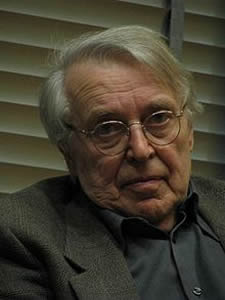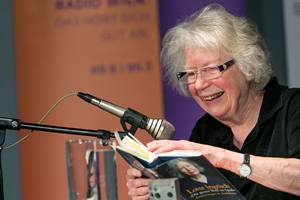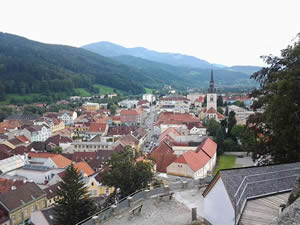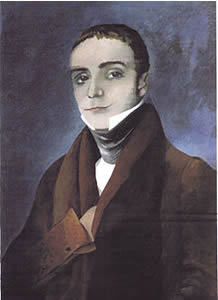De Tsjechische schrijver Pavel Kohout werd geboren op 20 juli 1928 in Praag in wat toen nog Tsjecho-Slowakije werd genoemd. Zie ook alle tags voor Pavel Kohout op dit blog.
Uit: The Widow Killer (Vertaald door Neil Bernel)
“Thunder, mused Chief Inspector Buback, in February? It was over before he knew it. A large aerial bomb, he realized, and it had fallen uncomfortably close by.
The building of the Prague Gestapo, where Buback worked as liaison officer for the Reich’s criminal police office, swayed wildly for what seemed like an eternity, but did not collapse. The proverbial quiet followed the storm; time stopped. Eventually sirens began to wail, and the officers and secretaries trooped down to the shelter.
He stared, motionless, at the two faces on his desk.
Buback disliked the shelter, in the basement of the old Petschke Bank. Some of its safes had been converted into cells; he’d heard a good interrogation there helped political prisoners remember all sorts of forgotten details. So he stayed upstairs, thunderstruck: the blast and the shaking had brought Hilde and Heidi back to life.
Their framed picture had traveled with him throughout the war. The offices changed, as did the cities and countries, but everywhere they had smiled radiantly at him, older and younger versions of a quiet, soothing loveliness. He conducted meetings and interrogations as they gazed at him from that final peacetime summer on the Isle of Sylt; for the most part he barely noticed them. But not an hour went by without Buback remembering in a flash of joy that they were alive.
They had been on his desk last year in Antwerp as men in other departments prepared for the retreat by burning documents in the courtyard. He had sneezed as the pungent smoke tickled his nose, and for a moment he did not understand the voice on the telephone telling him that both of them were dead. The smiles in the picture still glowed inside him; they flatly contradicted what he heard. Then the official from Berlin headquarters read him the police report.”

De Oostenrijkse schrijfster Lotte Ingrisch (geb. Charlotte Gruber) werd geboren op 20 juli 1930 in Wenen. Zie ook alle tags voor Lotte Ingrisch op dit blog.
Uit: Die doppelte Lotte
„Vielleicht habe ich ein Rätsel gelöst. Ein Geheimnis erraten. Ich wiederhole, vielleicht. Aber wenn, wird es Ihr Leben verändern.
Ich bin alt. Die nach mir kommen, sollen forschen, rechnen, experimentieren. Meine privaten Theorien wissenschaftlich bestätigen oder widerlegen. Wenn sie aber bestätigt werden …
Begleiten Sie mich auf meiner Entdeckungsreise. Sie war verblüffend, erschreckend und fast immer komisch. Ich hab mich gewundert, mich gefürchtet, aber viel gelacht. Ich lache gern und wünsche mir, dass Sie es bei der Lektüre auch tun. Schrecken und Komik liegen so nah beieinander.
Materialisten behaupten, dass es nur Materie gibt. Sie berufen sich auf ihre nicht gemachten Erfahrungen, was an einen Maulwurf erinnert, der die Milchstraße leugnet. Der Ärmste, er kann sie nicht sehen. Im Gegensatz zu ihnen erkläre ich aufgrund gemachter Erfahrungen den Kosmos der Maulwürfe für ein Hirngespinst von Blinden. Sinnlos, sich an ihm orientieren zu wollen.
Im Namen der Milchstraße berichte ich von Erfahrungen, welche die Existenz von Doppelgängern und parallelen Universen dokumentieren. Dazu eine kleine Einführung:
Der Doppelgänger ist eine Person, die so ausschaut wie, zum Beispiel, Sie – obwohl Sie es gar nicht sind. Doppel- gänger sind aus allen Zeiten und Kulturen bekannt. Sie haben viele Namen. Ob feinstofflicher, siderischer, astraler, Äther- oder Hauchkörper – ich nenne ihn am liebsten Quantenleib. Teilchenkörper und Quantenleib sind Erscheinungen unserer Doppelnatur. Wir sind sowohl materiell als auch immateriell, was nicht erschreckend, sondern ein Segen ist.“

De Oostenrijkse schrijfster Elfriede Kern werd geboren op 20 juli 1950 in Bruck an der Mur. Zie ook alle tags voor Elfriede Kern op dit blog.
Uit:Kopfstücke
„Man täuscht sich da oft, hat die Frau gesagt, ohne Säge ist nicht viel zu machen, das könnte in ein Gemetzel ausarten, und dazu möchte ich mich eigentlich nicht hergeben. Wenn es nicht sauber und einigermaßen schmerzlos gemacht werden kann, dürfen Sie auf meine Hilfe nicht zählen. Ich bin verzweifelt. Es ist ganz ausgeschlossen, daß ich hier im Zug irgendwo eine Säge auftreibe. Säge oder Axt, hat die Frau gesagt, beides ist möglich. Auch eine Axt wird sich hier im Zug nicht finden, sie weiß das genausogut wie ich. Dann ist also alles umsonst gewesen, hab ich gesagt, Yolande hat umsonst so tapfer durchgehalten und kann mir mit Recht den Vorwurf machen, daß ich ihr Bein ganz unnötig aufs Spiel gesetzt habe. Sie beobachtet uns die ganze Zeit, hat die Frau gesagt und an mir vorbei ins Abteil geschaut, sie schöpft Verdacht, wenn wir noch lange hier draußen stehenbleiben.“

Bruck an der Mur
De Amerikaanse schrijver Thomas Louis Berger werd geboren op 20 juli 1924 in Cincinnati, Ohio. Zie ook alle tags voor Thomas Berger op dit blog.
Uit: Best Friends
“Such terms made Roy uncomfortable, and he himself never used them. “I’m trying to tell you there’s no boffer or boffee. There’s just your humble servant and another self-commanded person. Sometimes we’re lovers and sometimes not.”
“Lovers?” Sam gestured with his own stein, which he had long since emptied and was politely waiting to refill at Roy’s convenience. “See, that’s what I don’t get. The sex I can understand better than what you call love. How can one-night stands, even with the same partner for a week or two, be love?”
Sam would never understand that for Roy, making love could be a three-second meeting of the eyes with a woman in the window of a passing bus. At the same time, Roy still loved all the women with whom he had ever had intimate relations, a sizable company if not as multitudinous as Sam imagined, though no account was actually kept. Roy liked to think a great many of his former partners shared the feeling, though he knew not all did. There were of course those who felt rejected, even betrayed, when it was he who brought it to an end, and not even all of those who took the initiative in terminating the affair could forgive him for sincerely agreeing with their decision.
Roy tried to recognize his own inadequacies, though more than one of the women he had frequented disparaged his sort of self-criticism as being actually an insidious form of conceit. But there were those who found it attractive in a man forthrightly to admit his flaws without using such an admission as a pretext for an array of attention-demanding excuses. Roy would readily apologize, but he rarely explained. There were those who saw that as a kind of honesty all too uncommon in the male sex. Not all women want to be lied to, as Roy would tell the ones he thought might agree, and he was right often enough.”

Cincinnati
De Engelse dichter Thomas Lovell Beddoes werd geboren op 20 juli 1803 in Clifton. Zie ook alle tags voor Thomas Lovell Beddoes dit blog.
Song On The Water
As mad sexton’s bell, tolling
For earth’s loveliest daughter
Night’s dumbness breaks rolling
Ghostily:
So our boat breaks the water
Witchingly.
As her look the dream troubles
Of her tearful-eyed lover,
So our sails in the bubbles
Ghostily
Are mirrored, and hover
Moonily.
To Night
So thou art come again, old black-winged night,
Like an huge bird, between us and the sun,
Hiding, with out-stretched form, the genial light;
And still, beneath thine icy bosom’s dun
And cloudy plumage, hatching fog-breathed blight
And embryo storms, and crabbéd frosts, that shun
Day’s warm caress. The owls from ivied loop
Are shrieking homage, as thou cowerest high;
Like sable crow pausing in eager stoop
On the dim world thou gluttest thy clouded eye,
Silently waiting latest time’s fell whoop,
When thou shalt quit thine eyrie in the sky,
To pounce upon the world with eager claw,
And tomb time, death, and substance in thy maw.

Portret door Rosalind Bliss, 2007
